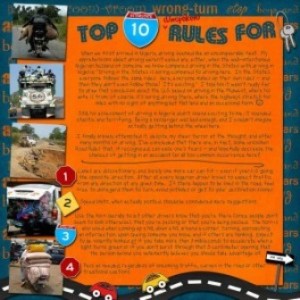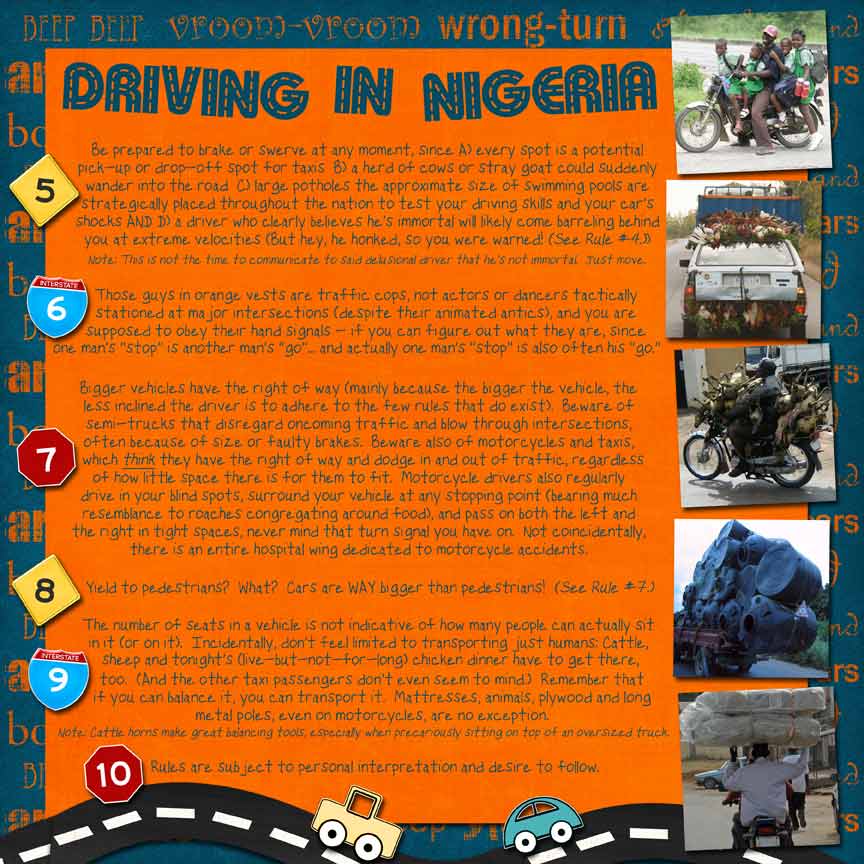After months of terror and apprehension, following her arrival in Nigeria with her husband and children, Christy, an American missionary, summoned the courage to drive a car. She later discovered and documented 10 unspoken driving rules, which she believes can reduce road accidents on Nigerian road…
[dropcap]C[/dropcap]hris and Christy are a couple and Americans born and raised in Michigan and Florida respectively. When in 2009, they decided to relocate to Nigeria, driving was the least challenge they looked forward to. After all, unlike United Kingdom, Nigeria and American cars are left-hand-drive and motorists in both countries drive on the right side of the road.

 Being a licensed driver from United States, Christy, Chris’ wife knew she would need to drive. But what she witnessed on the road was what she never expected could be taking place in any part of the world. She looked at drivers, motorcyclists and traffic and became short of words. She became more worried, because for her to survive in Jos, she would need to get on the road
Being a licensed driver from United States, Christy, Chris’ wife knew she would need to drive. But what she witnessed on the road was what she never expected could be taking place in any part of the world. She looked at drivers, motorcyclists and traffic and became short of words. She became more worried, because for her to survive in Jos, she would need to get on the road
But for weeks, she could not take the risk. “Driving seemed like an unconquerable feat”, she recalled in her online blog. Her apprehension about driving around her new home was not eased either, even when a well-intentioned Nigerian husband of someone known to her described driving in the United States as being boring compared to driving in Nigeria.
The Nigerian explained to Chris that while in the US, “everyone follows the same rules, in Nigeria, everyone makes up their own rules – and then they don’t even follow those! It’s exciting.”
Although the said analyst’s presentation of driving culture in Nigeria was rather from a positive point of view, Christie was far from being excited. What she could see was chaos. And the fact that she might at a point have to be on that road terrified her.
“Being a passenger was bad enough, and I couldn’t imagine actually getting behind the wheel here,” recalled Christy. But despite her sheer terror at the thought, Christie finally made a brave attempt to get behind the wheel.
After many months of cruising on Nigerian roads, she discovered a different motoring world, a place where accident is commonplace. However, she also discovered that in most parts of the country, there are 10 unspoken Road Rules that, if recognized, can ease one’s fears – and hopefully decrease the chances of getting involved in an accident.
Christy’s 10 Unspoken Driving Rules in Nigeria
- Lanes are discretionary, and surely one more car can fit – even if yours is going the opposite direction. After all, every Nigerian driver knows to expect traffic from any direction at any given time. If there happen to be lines in the road, feel free to disregard them to turn, avoid potholes or get to your destination sooner.
- Speed limits, when actually posted, should be considered mere suggestions.
- Use the horn liberally to let other drivers that you’re there (since people don’t seem to look otherwise), that you’re passing or that you’re being passed. The horn is also used when coming up a hill, down a hill, around a corner, turning, approaching an intersection, upon seeing someone you know, and if others are honking. Expect to be violently honked at if you take more than 3 milliseconds to accelerate when a light turns green or if you don’t burst through that 5 centimeter opening that the person behind you vehemently believes you should take advantage of.
- Pass as needed, regardless of oncoming traffic, curves in the road or other traditional cautions.
- Be prepared to brake or swerve at any moment, since A) every spot is a potential pick-up or drop-off spot for taxis B) a herd of cows or stray goat could suddenly wander into the road C) large potholes the approximate size of swimming pools are strategically placed throughout the nation to test your driving skills and your car’s shocks AND D) a driver who clearly believes he’s immortal will likely come barreling behind you at extreme velocities (But hey, he honked, so you were warned! (See Rule Number4.) Note: This is not the time to communicate to said delusional driver that he’s not immortal. Just move.
- Those guys in orange vests are traffic cops, not actors or dancers tactically stationed at major intersections (despite their animated antics), and you are supposed to obey their hand signals – if you can figure out what they are, since one man’s “stop” is another man’s “go”… and actually one man’s “stop” is also often his “go.”
- Bigger vehicles have the right of way (mainly because the bigger the vehicle, the less inclined the driver is to adhere to the few rules that do exist). Beware of semi-trucks that disregard oncoming traffic and blow through intersections, often because of size or faulty brakes. Beware also of motorcycles and taxis, which think they have the right of way and dodge in and out of traffic, regardless of how little space there is for them to fit. Motorcycle drivers also regularly drive in your blind spots, surround your vehicle at any stopping point (bearing much resemblance to roaches congregating around food), and pass on both the left and the right in tight spaces, never mind that turn signal you have on. Not coincidentally, there is an entire hospital wing dedicated to motorcycle accidents.
- Yield to pedestrians? What? Cars are WAY bigger than pedestrians! (See Rule Number7.)
- The number of seats in a vehicle is not indicative of how many people can actually sit in it (or on it). Incidentally, don’t feel limited to transporting just humans: Cattle, sheep and tonight’s (live-but-not-for-long) chicken dinner have to get there, too. (And the other taxi passengers don’t even seem to mind.) Remember that if you can balance it, you can transport it. Mattresses, animals, plywood and long metal poles, even on motorcycles, are no exception. Note: Cattle horns make great balancing tools, especially when precariously sitting on top of an oversized truck.
- Rules are subject to personal interpretation and desire to follow.
…And this is why we pray for safety before driving! And why we shouldn’t have posted these driving rules until AFTER Chris’s parents came to visit us!!
Navigating the Roads
Even after Christie had been driving, herself, her husband and even kids were still full of thoughts about what they experience on the roads
Christie: Hoping Chris’s parents still come Chris:Hoping my parents don’t make us take them back to the airport after an hour in the car Judah: “Ooh, another sheep!”
It has been six years since, Christie and her family relocated from their home in Orlando, Florida to serve with Wycliffe Bible Translators. But the question many Nigerians reading this story might ask is why in the world would any American family decided to relocate, not to Western Nigeria, but to a city that had been in the news worldwide due to outbreaks of violence…with intermittent (at best) power, water and fuel shortages, sketchy Internet…thousands of miles away from their friends and family?
“Because the impact of God’s Word on an individual’s life has a transforming power,” answered Christie, adding, “And for millions of people in Africa’s most populous nation, it is simply not accessible. Plus, God told us to go, so it would have been wrong NOT to move here!”






